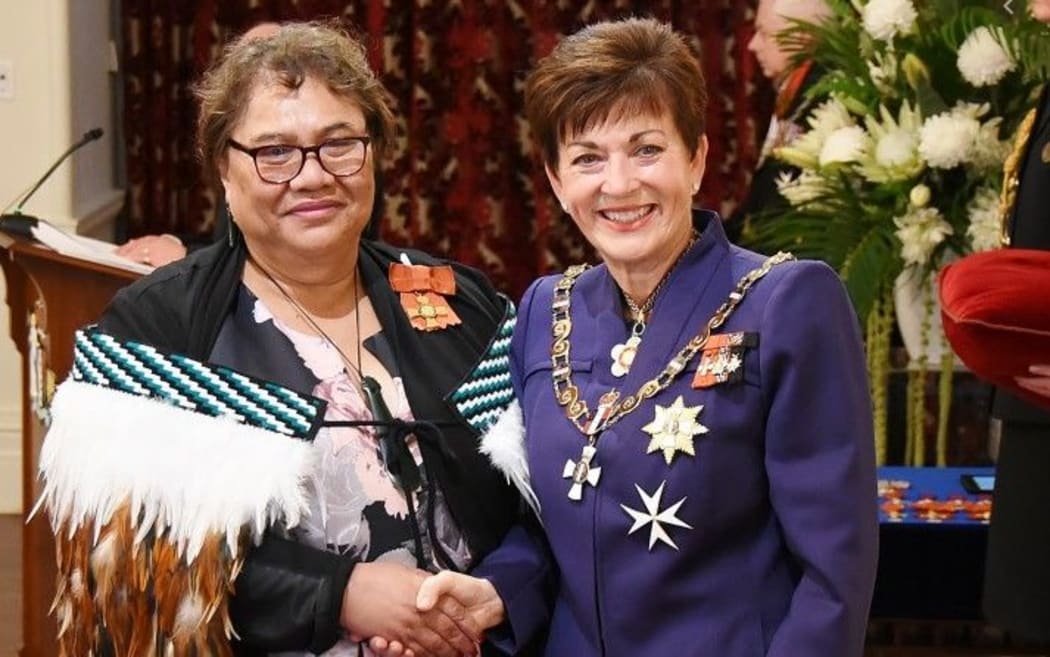The lead negotiator for South Taranaki iwi Ngāruahine has been remembered as a formidable woman who held a wealth of whakapapa knowledge.

Tihi Noble receives her ONZM from Governor-General Patsy Reddy. Photo: Office of the Governor-General of NZ
Tihi Anne Daisy Noble died aged 66 at her home at Māwhitiwhiti Kanihi Pā in Ōkaiawa and was laid to rest at Waitoto urupā earlier this week.
She was made an Officer of the New Zealand Order of Merit for services to Māori in recognition of her negotiation of the iwi fisheries settlement and as lead negotiator for the Ngāruahine settlement.
More recently, Noble was a part of the negotiations for the Mount Taranaki settlement, which would see the name Taranaki Maunga restored.
Noble's niece, Dee Sciascia, said her aunty was a "pātaka kōrero, pātaka mātauranga", a holder of whakapapa knowledge for her whānau, hapū and iwi.
"She didn't share it with everybody, it wasn't something that she just freely gave out. You had to go see her, you had to be sitting in front of her to see that kōrero... she was quite old school in that way.
"She was very mindful that nothing beats kanohi-kite-kanohi [face-to-face]."
Noble once told Sciascia she had a database of more than 10,000 names of iwi members.
"If I wanted to know a whakapapa line say to share with my tamariki, I would go to my aunty and there's no one else within my wider whānau, hapū or dare I say, our iwi, who would have the depth and breadth of knowledge of our aunty in that respect."
It was her aunty who first encouraged her and mentored her to enter into iwi governance as a rangatahi hapū representative on the fisheries board in the early 2000s.
"She was very focused on bringing our young people through and her gaze was firmly fixed on the new generation and the generations to come so she had lots of time for her nieces and nephews [and] once we grew up, that shifted to our kids."
Sciascia spent weekends at the pā with her aunty reading her manuscripts and listening to her kōrero as part of a rangatahi research collective which produced 10 different waiata to help transmit whakapapa knowledge to uri (descendants).
"Beautifully, we were able to resurrect some of [those] waiata and sing those throughout her tangihanga and the day of her burial which was of course very fitting for our aunty and all of the kōrero that she shared."
Noble wasn't afraid to speak her mind, Sciascia said, whether it be to someone within the whānau or the Treaty Negotiations Minister.
"If she had something to say and she knew she was right, and it needed to be delivered in a particular way to land with you, you felt that power, you felt that mana of her kupu.
"Often it would be a slightly raised voice, you could feel the vibrations, you could feel almost the fear but that's why I say she was formidable, very very strong, backed up by the kōrero that she held and that was given to her by her elders."
Noble was integral in the planning for a new pā and cultural hub at Kanihi, which received $5 million from the shovel-ready projects fund last year.
"The really bittersweet moment, while we've embarked on this journey for the rebuild for our pā, she won't be here to see it realised in the flesh.
"We've all really refocused our energies on wanting to get in behind this rebuild and try our very, very best to honour our aunty and her dreams and aspirations for our people and our pā and to see the rebuild through to the end in her honour," Sciascia said.
Moe mai rā e mareikura, moe mai rā.




